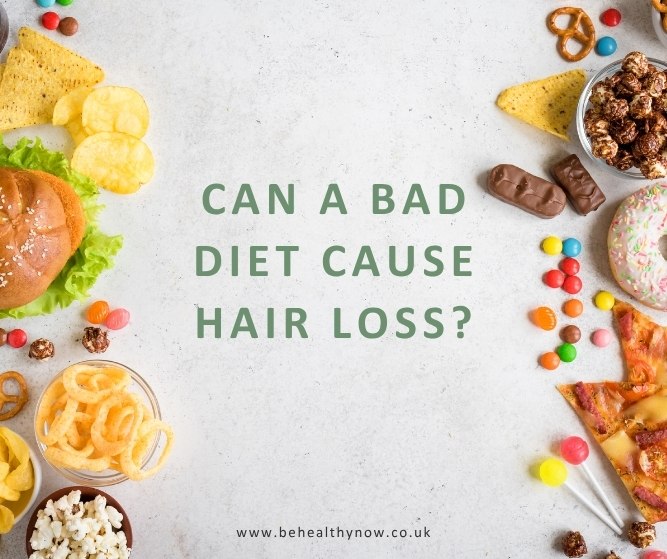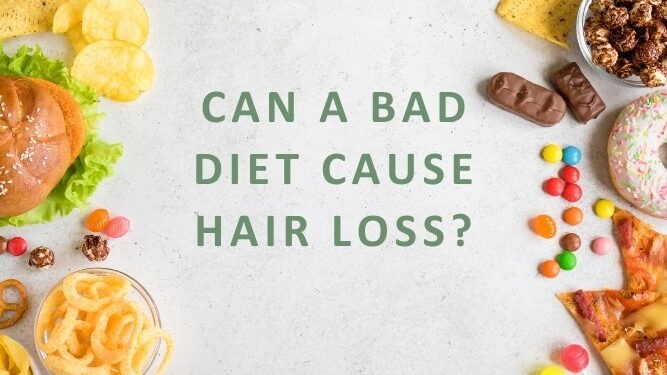
If you’re losing more hair than usual, your diet could be playing a big role. A poor diet, missing key nutrients like protein, iron, and healthy fats, can definitely lead to hair thinning and even hair loss.
Hair relies on a steady supply of nutrients to grow well and stay strong, and when you don’t get enough of them, hair growth can slow down, while shedding picks up.
Here’s what’s going on and how you can turn it around with simple changes to your meals and lifestyle.
Table of Contents
Why Does Your Hair Need Good Nutrition?
Your hair might seem like it’s just there to look good, but it actually needs a steady supply of nutrients to stay healthy and grow well. Hair is made up of a protein called keratin, and it’s one of the fastest-growing tissues in your body—so it has high nutrient demands.
When you eat balanced meals that include enough protein, iron, and essential vitamins and minerals, you’re giving your hair the fuel it needs to grow thicker and stronger. These nutrients help keep your hair follicles working properly and your strands looking healthy.
On the flip side, if your diet is missing these key nutrients, your hair can start to thin out or even fall out. In fact, research shows that hair follicles are sensitive to nutritional deficiencies, which can disrupt the hair growth cycle and lead to shedding. That’s why making sure you’re eating well is so important for healthy hair.
The Key Nutrients Your Hair Needs
Your hair is like a garden—it needs the right nutrients to grow well and stay strong. Let’s take a look at some of the most important ones:
Protein
Protein is the main building block of your hair. Without enough of it, hair can become weak and brittle. Eggs, fish, lean meats, beans, and tofu are great ways to get more protein in your meals.
Iron
Iron helps your blood carry oxygen to your hair follicles, which is essential for healthy hair growth. If you’re low on iron, you might notice more hair falling out. You can get more iron from foods like red meat, spinach, lentils, and quinoa. According to research, low iron levels have been linked to increased hair shedding, especially in women.
Zinc
Zinc helps repair hair tissues and keeps the oil glands around your follicles working well. You can find zinc in nuts, seeds, whole grains, and dairy.
Vitamins for Healthy Hair
Vitamins A, C, D, and E are all important for hair growth.
Vitamin A (found in carrots and sweet potatoes) helps produce sebum to keep your scalp moisturized.
Vitamin C (in citrus fruits and berries) boosts collagen, which supports hair structure.
Vitamin D (found in fatty fish and eggs) helps create new hair follicles, while vitamin E (in almonds and sunflower seeds) helps protect your hair from damage.
B Vitamins
B vitamins, especially biotin (B7), are essential for healthy hair. They help carry oxygen and nutrients to your scalp, promoting stronger hair.
You can get B vitamins from whole grains, leafy greens, eggs, nuts, and avocados.
However, research suggests that unless you have a deficiency, taking extra B vitamins might not make a difference—and in some cases, taking too many supplements can actually harm your hair.
Omega-3 Fatty Acids
Omega-3 fatty acids help keep your hair shiny and nourished. Salmon, walnuts, chia seeds, and flaxseeds are great choices for getting more omega-3s in your diet.
Other Helpful Nutrients
There are also smaller players that help support hair health. Magnesium (found in nuts and leafy greens), selenium (in Brazil nuts and seafood), and copper (in shellfish and seeds) can all play a role in keeping your hair healthy.
Eating a variety of these nutrient-rich foods gives your hair the best chance to stay strong and keep growing.
What Happens to Your Hair When You Don’t Eat Well
When your diet is missing the nutrients your hair needs, the hair follicles (the tiny structures in your scalp where hair grows) can start to weaken. Without a steady supply of protein, vitamins, and minerals, hair becomes more likely to break, thin out, and fall out.
Going on crash diets, skipping meals, or cutting calories too low puts your body under stress. Since hair isn’t essential for survival, your body will focus on more important things first, like keeping your organs working.
This means your hair growth slows down or stops altogether. That’s why you might notice more hair shedding if you’ve been on a restrictive eating plan.
It’s also important to remember that hair loss from poor nutrition doesn’t happen overnight. It usually takes a few months for nutrient deficiencies to show up in your hair.
So if you’re seeing more hair thinning and you’ve recently changed your diet, there’s a good chance the two are connected.
How to Tell If Your Diet Is Hurting Your Hair
One of the first signs that your diet might be to blame for hair loss is noticing more strands in the shower or on your hairbrush. Your hair might also start to look dull, feel weaker, or break more easily.
Other signs can include a receding hairline, slower regrowth, or hair that feels unusually dry and brittle. In some cases, you might even notice changes to your scalp, like flakiness or itchiness—another sign that your body isn’t getting the nutrients it needs.
Can Diet Changes Really Help?
If you’ve been skipping meals or following a restrictive diet, these hair changes could be your body’s way of telling you it’s time to eat better. The encouraging part is that in many cases, hair loss caused by poor nutrition can be turned around by adding more of the right foods to your meals.
Balanced meals with plenty of protein, iron, and healthy fats can help hair grow back stronger and healthier—though it might take a few months of good eating before you start to see results.
Easy Ways to Eat for Healthy Hair
Getting the right nutrients doesn’t have to be complicated. Here are some practical tips and examples to help you support your hair:
1. Power Up with Protein
Hair is made of protein, so eating enough of it is essential. Add eggs to your breakfast, toss grilled chicken or tofu into your salad, or snack on Greek yogurt. Beans and lentils are great plant-based sources too.
2. Focus on Iron-Rich Foods
Iron helps your hair follicles stay healthy. Try making a spinach and lentil curry, or include lean red meat a couple of times a week. Quinoa is another good plant-based option.
3. Add Healthy Fats
Healthy fats keep your hair shiny and nourished. Top your toast with avocado, sprinkle chia or flaxseeds on yogurt or smoothies, and add walnuts or salmon to your meals.
4. Fill Your Plate with Colourful Foods
Colourful fruits and veggies are packed with vitamins and antioxidants that support hair health. Berries, like blackberries, blueberries, and raspberries, have been shown to promote hair growth by protecting hair follicles from oxidative stress.
Mediterranean diet staples—like tomatoes, leafy greens, and olive oil—can also support healthy hair and even reduce the risk of certain types of hair loss.
5. Explore Functional Foods
Some foods go beyond basic nutrition and offer extra benefits for your hair. Research suggests that functional foods like rice bran extract, red ginseng oil, and annurca apple polyphenols may have unique hair-promoting properties. While these are mostly early-stage studies, including a variety of nutrient-rich foods in your diet can be a great start.
6. Stay Hydrated
Don’t forget water! Drinking enough water every day helps keep your scalp and hair hydrated.
When to Think About Other Causes of Hair Loss
Even if you’re eating well, hair loss can sometimes be due to other factors. Stress, hormonal changes, genetics, and autoimmune conditions like alopecia areata can all play a role in hair shedding.
According to research, conditions like androgenetic alopecia (male and female pattern hair loss) and telogen effluvium (sudden shedding) can also be triggered by things other than diet.
If you’re seeing continued hair loss, or if you notice sudden, patchy bald spots, it’s a good idea to talk to a professional. A clinic like Treatment Rooms London can help figure out what’s causing your hair loss and suggest options that work best for you.
Eat Well, and Your Hair Will Thank You
Healthy hair starts with a healthy diet. By making sure you’re getting enough protein, iron, healthy fats, and colourful fruits and vegetables, you’re giving your hair what it needs to grow strong and stay healthy.
If you’ve noticed more hair loss than usual, take a closer look at what you’re eating. A few simple tweaks to your meals can make a big difference for your hair and for how you feel overall.
Remember, your hair is a reflection of your overall health. Eating a balanced diet doesn’t just help your hair—it helps you feel your best from the inside out.

























